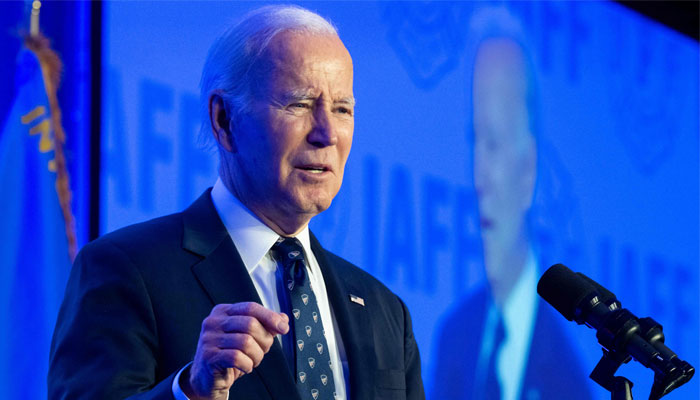Biden throws down 2024 gauntlet with populist budget
Republicans to block most of Biden’s proposals, arguing that spending cuts, not tax raises, are the solution to resolving the country’s ballooning debt
March 09, 2023

- Stiff taxes imposed promising to assist country’s "working families."
- Biden seeks support framing them as party of ordinary Americans.
- Republicans to block Biden’s proposals, arguing spending cuts are solution to debt.
PHILADELPHIA: President Joe Biden presented Thursday what amounts to his 2024 reelection pitch on the US economy, with a proposed budget targeting the rich with stiff new taxes while promising to assist the country’s "working families."
The details released by the White House — due to be laid out in person by Biden in a speech later in Philadelphia — throw down the gauntlet to Republicans as the president builds to an expected reelection campaign announcement.
Republicans in Congress will certainly block most of Biden’s proposals, arguing that spending cuts, not tax raises, are the solution to resolving the country’s ballooning debt.
However, they are now under pressure to explain where they would reduce spending. Democrats, meanwhile, are trying to seize the populist high ground by framing themselves as the party of ordinary Americans.
Biden’s plan will "invest in America, lower costs and cut taxes for working families," the White House said. "President Biden has long believed that we need to grow the economy from the bottom up and middle out, not the top down."
The main points in Biden’s budget proposal include a pledge to slash the federal deficit by $3 trillion over the next decade.
Among measures achieving that would be a minimum 25 % tax on the wealthiest 0.01 % of Americans. And the corporate tax would rise to 28 %, reversing a huge tax cut enacted under President Donald Trump in 2017, the White House said.
Trump brought in a 21 % rate, down from 35 %, but the effective rate actually paid by corporations, according to the White House, is currently less than 10 %.
Biden is also proposing to raise taxes on those earning more than $400,000 a year to ensure that Medicare — the government-funded health insurance system for people over 65 — remains solvent.
Hiking the Medicare tax from 3.8 to 5.0 % for those wealthy individuals would ensure the program’s viability for more than two decades, the White House says.
"My budget will ask that the rich pay their fair share so the millions of workers who helped build that wealth can retire with the Medicare they paid into," Biden tweeted Thursday.
Populist pitch
Most of Biden’s proposed budget is basically a wish list.
It’s the "start of a healthy dialogue," according to Shalanda Young, director of the Office of Management and Budget.
Republicans have rejected voting for any tax increases, saying Biden is pushing out-of-control spending and anti-business policies.
"President Biden has submitted a budget proposal that is wasteful, unserious, and behind schedule," Republican Senator Bill Hagerty said.
Earlier this week, top Senate Republican Mitch McConnell vowed that "massive tax increases, more spending... will not see the light of day."
However, Biden’s gambit is that by laying out a deficit-cutting plan funded by the very wealthy he can look fiscally responsible and in touch with middle-class voters at the same time.
One item Republicans will have a harder time arguing with is a request for record defence spending at $842 billion in 2024, a 3.2 % increase.
In Biden’s election-ready narrative, the wealthy are currently getting a free ride, while the struggling middle class just needs a "little bit of breathing room."
However, the battle of narratives is far from just academic.
The US Treasury has effectively already run out of money for this year — and urgently needs Congress to approve taking on extra debt or risk plunging the economy into crisis.
The previously approved $31.4 trillion borrowing ceiling maxed out in January. If the borrowing limit is not increased or suspended before current emergency measures expire, then the US government could default on its obligations for the first time.
That doomsday scenario could kick in as early as July, the Congressional Budget Office said in February.
Republicans say the ever-growing federal debt points to the need for slashing spending, but Democrats say Republicans are using the issue as a way to weaken Medicare and other long-popular programs.











